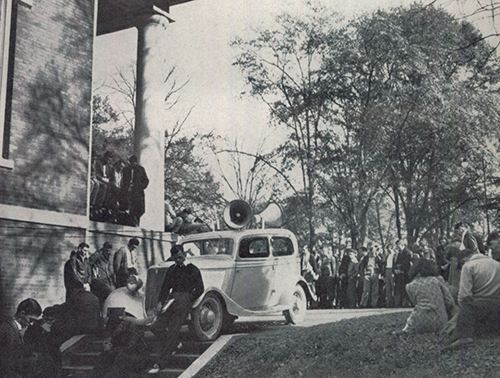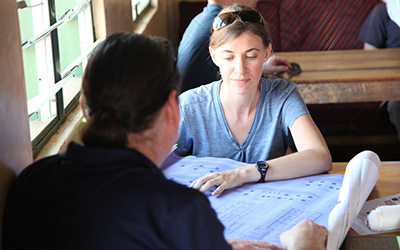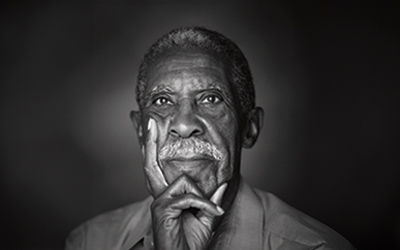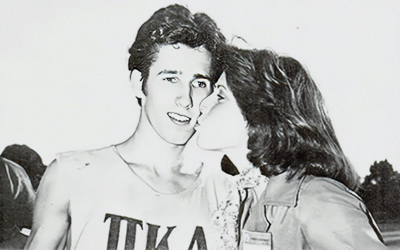An alumnus’ life mirrors the changes that Auburn—and the nation—underwent because of WWII

Students gathered outside on the steps of Langdon Hall to hear the emergency
news broadcast of the attack on Pearl Harbor.
ALABAMA POLYTECHNIC INSTITUTE (API) on Dec. 6, 1941 was much the same as it had been for decades—season after season of football games, dances and generations-old student traditions—but on the following morning, the Plains’ rural tranquility would change forever.
Just weeks before Christmas break, students crowded the steps of Langdon Hall, listening to the newsflash that rocked the nation: the Empire of Japan had launched a surprise attack on the U.S. Naval base at Pearl Harbor, Hawaii. After resisting involvement in the conflict that was slowly engulfing the rest of the world, the U.S. was now unquestionably at war.
The five years that immediately followed that day would be a watershed moment in the history of Auburn University, profoundly altering everything from the size of the student body to the curriculum and athletic program. David Gardiner ’41 was one of many Auburn alumni who fought in the war, and whose life would be profoundly changed by it.
Gardiner was born into poverty in Farley, Ala., the second of six children. He was 11 when the Great Depression began, and 15 when his father died. As the eldest son, he helped raise his younger brothers and sisters and kept his family afloat.
“You go through things like that, you learn hard work,” said Cliff Gardiner, associate dean for the college of science and mathematics at Augusta University and David’s second son. “You learn lessons of durability and resilience, and not complaining—my father was never a complainer.”
David Gardiner entered API as an agriculture major, intending to graduate and return to his family farm. In his spare time, he played baseball but, conspicuously, also participated in API’s Reserve Officer Training Corps (ROTC) program at a time when enlistment was not compulsory. News of Nazi Germany’s invasion of Europe had undoubtedly reached Auburn by then, but Gardiner signed up anyway.
“He knew the world was at war, and he chose to enroll in ROTC,” said Cliff. “Given the patriotism of the time, he may have done it because he believed that was his duty. He understood duty extremely well.”
Gardiner was deployed to Hawaii as a member of an antiaircraft barrage balloon unit, a relatively easy assignment. That changed in 1944. As a second lieutenant in the Army, Gardiner was appointed commander of an anti-aircraft battery and sent across the Pacific to liberate the Philippines from the Japanese. The Filipino people suffered horrific atrocities after falling under enemy occupation in 1942, and welcomed the allied Filipino-U.S. forces as liberators.
“I know that his unit got credit for at least one kill of a Japanese bomber,” recalled Cliff. “But I’m sure that his men were probably under attack multiple times. He never talked about that, except for the triumph of getting credit for a kill shot.”
Cliff still has the 40-millimeter shell casing his father brought back, the same kind used to shoot down enemy aircraft.
After the Philippines, Gardiner went ashore at the Battle of Okinawa and remained there until Japan formally surrendered on Sept. 2, 1945. For his service he was awarded two Bronze Stars and a Philippines Liberation Ribbon. But none of that mattered to him. In fact, said his son, he never heard his father mention any service medals. “I got to come home,” he told his son. “That’s what [victory] meant to me.”
At the time, President Luther Duncan estimated that around 800 veterans would enroll at Auburn through the G.I. Bill. Instead, 1,575 registered in the winter quarter of 1946 alone. At its peak in 1948-49, more than 9,000 veterans were attending Auburn. Because Auburn was segregated at the time, the GI Bill did not fix diversity issues, but the veterans’ arrival would transform everything from student housing and class schedules to campus dining and dress codes. The influx of battle-tested adult men would reshape collegiate athletics across the country.
For alumni like Clarence “Pappy” Boynton ’48, who came to Auburn as a veteran, the war had created a new generation of students. “It gave me added responsibility and a new sense of purpose,” said Boynton, now 101. “The military regimen instilled me with discipline, the value of depending on your fellow servicemen, family and friends and an ever-greater commitment to my country while at war.”
In the years that followed the war, Gardiner became a cotton marketing specialist for the USDA and eventually retired in 1983 as superintendent of the Cotton Division for Georgia. Though he lived to the ripe age of 102, he never spoke out for armed conflict. And to Cliff ’s surprise, he never judged the young people who protested against serving.
Seventy-four years after the war ended, on his 100th birthday, Gardiner was interviewed by television reporters at the Georgia War Veterans Home in Augusta, Ga. where he lived. They asked him what he thought of the conflict all these years later.
“War is a waste of time,” Gardiner sighed.
“People should learn to get along.”
Building Hope: Disaster Relief Architecture & Design
Combining faith and design, disaster response architect Sarah Elizabeth Dunn ’03 builds shelters for disaster-stricken communities around the world.
Harold Franklin Reflects on Integration 50 Years Later
Fifty years ago, unsure of his safety, a tall, soft-spoken Black man walked alone across the Auburn campus to register for classes.
Auburn Love Stories: How They Met
From blind dates to football games to chance meetings in the classroom, Auburn alums reflect on how they found love and everlasting romance on the Plains.
Building Hope: Disaster Relief Architecture & Design
Combining faith and design, disaster response architect Sarah Elizabeth Dunn ’03 builds shelters for disaster-stricken communities around the world.
Harold Franklin Reflects on Integration 50 Years Later
Fifty years ago, unsure of his safety, a tall, soft-spoken Black man walked alone across the Auburn campus to register for classes.
Auburn Love Stories: How They Met
From blind dates to football games to chance meetings in the classroom, Auburn alums reflect on how they found love and everlasting romance on the Plains.


